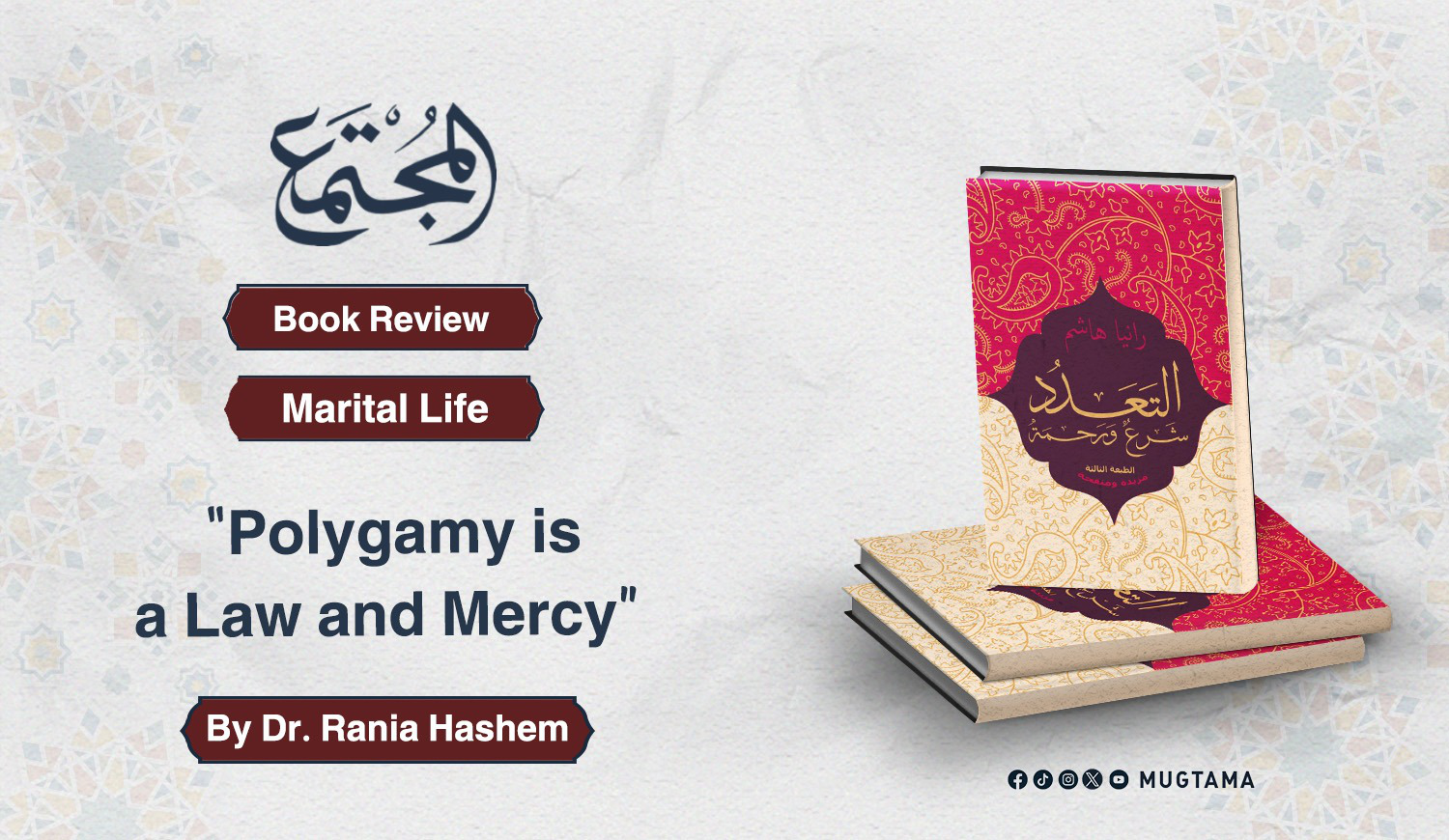Book Review: “Polygamy is a Law and Mercy” By Dr. Rania Hashem

In her book “At-Ta`adud
Shari`ah Wa Rahma (Polygamy is a Law and Mercy)”, Dr. Rania Hashem presents
the religious, logical, and rational arguments in her call for polygamy, seeking
to launch a woman-to-woman dialogue that addresses the issue from the female
perspective itself.
The book responds to social
misconceptions surrounding a man’s marriage to a second, third, or fourth wife,
affirming that polygamy was
legislated to honor, protect, and care for women, not to humiliate or diminish
them.
Dr. Hashem discusses the reasons
that support polygamy and make it a societal and practical necessity, pointing
out that the first form of love mentioned in the Quran was that of women, as
Allah Says, {The enjoyment of ˹worldly˺ desires—women,
children, treasures of gold and silver, fine horses, cattle, and fertile
land—has been made appealing to people.} [Ali `Imran 3:14]
Hashem, an Egyptian marital
consultant, argues that sometimes one woman may not be sufficient for a man —
whether due to a medical condition in the wife, a desire for children,
avoidance of divorce amid
family disputes, or the man’s wish to protect himself from temptation, among
other reasons.
Polygamy as a Remedy for Spinsterhood and Divorce
In her 158-page book, the author
explains that polygamy offers a viable solution to major social issues such as
spinsterhood, divorce, and marital infidelity.
She notes that the book addresses most of the arguments raised against polygamy
and aims to clarify a religious ruling that has been deliberately distorted,
referring to the verse: {Then marry other
women of your choice—two, three, or four.} [An-Nisa’ 4:3]
Dr. Hashem stresses that the
social reality in Arab and Muslim countries — characterized by rising rates of
divorce and spinsterhood, with
millions of unmarried men and women over thirty, and a large number of widows —
provides sufficient evidence to convince the hesitant and the doubtful of the
wisdom and necessity of polygamy.
Dr. Hashem urges media outlets,
educational institutions, and religious organizations to work on changing
entrenched negative perceptions and promoting a balanced and objective view of
polygamy.
She reminds readers that Islam did not
leave the man to marry as he pleases, but rather set strict ethical and legal
boundaries for him, as Allah Says, {But if you are
afraid you will fail to maintain justice, then ˹content yourselves with˺ one.} [An-Nisa’ 4:3]
Thus, if a man fears he will not
fulfill his responsibilities fairly, he must suffice with one wife.
The author not only discusses
polygamy in theory but also expresses her personal acceptance of it — both for
herself and for those close to her.
She presents real-life examples of women who helped their husbands marry
another wife or who welcomed a co-wife into their lives.
The Fate of Widows and Divorcees
Dr. Hashem clarifies that her
discussion of polygamy stems from what Shari`ah guarantees — justice in
spending, time, and treatment.
She denies that divorce is the reason for the destruction of families,
asserting instead that divorce rates continue to rise even as polygamy is
socially condemned and rarely accepted.
The author raises a poignant
question: What will become of widows and divorcees in a society that fights
and discourages polygamy?
She notes that the inner nature of men allows them to marry up to four wives,
and that had this not been part of their, Allah would not Have permitted it.
She adds that polygamy protects
women from harassment, assault, and falling into illicit relationships.
Social and Moral Benefits of Polygamy
The author adds that polygamy has
many other benefits such as, protection from immorality and the spread of
illicit behavior; chastity for both men and women, as men can be less than
women in numbers specially at war times; financial care and security for women;
increase in offspring and strengthening of the Muslim Ummah.
The Prophet Muhammad (peace be
upon him): “Marry women who are loving and very
prolific, for I shall outnumber the peoples by you on the Day of Resurrection.”
Polygamy in History is not Merely Islamic
Dr. Hashem points out that
polygamy is not an exclusively Islamic phenomenon; it has existed throughout
history and long before the emergence of Islam.
However, Islam introduced structure, ethics, and conditions to regulate it, making
it conditional, not absolute.
She continues: what is spent on
sinful relationships — mistresses, affairs, and immorality — far exceeds what
would be spent on a lawful second marriage.
Furthermore, the most recent
social conflicts have escalated during a time when polygamy has been declining,
which means that polygamy is not the cause of social problems but rather a
potential solution to them.
A Call for Reflection and Fair Dialogue
Overall, the book deserves
careful and fair reading, especially by women, before judging its author or her
ideas.
Polygamy, as Dr. Hashem concludes, represents a divinely ordained solution to
many of the issues afflicting modern Muslim families — including spinsterhood,
divorce, early widowhood, harassment, rape, immorality, and the erosion of
family stability.
For Further Reading:
- My Husband Second Marriage Broke Me!
- Prophet Muhammad (peace be upon him) as a Husband
- Book Review: “Family Life in Islam” By Khurshid Ahmad
-------------------------------------------------------------










